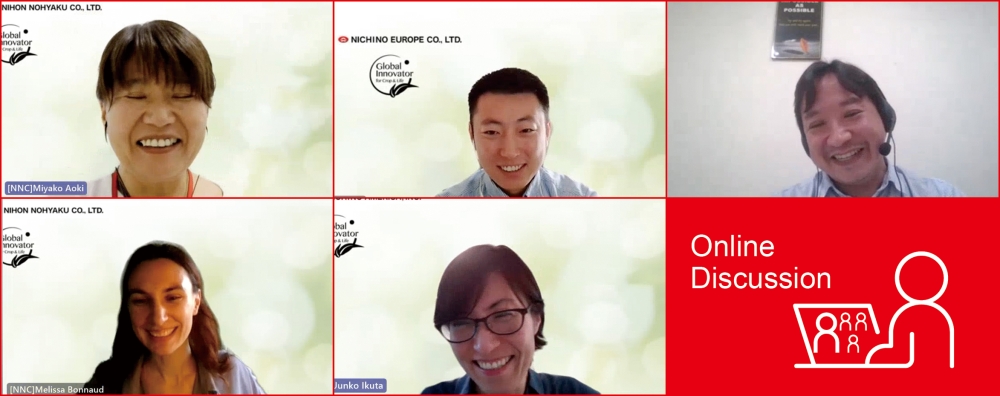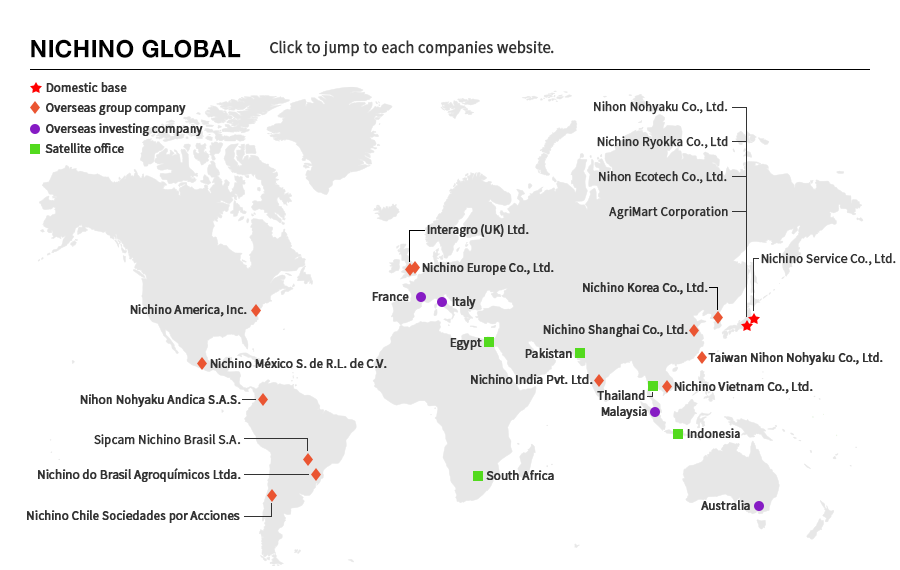Diversity Discussion
Profile
People with diverse backgrounds play an active role at Nihon Nohyaku. We gathered employees born outside Japan, in charge of overseas business, and working in other countries for a discussion.
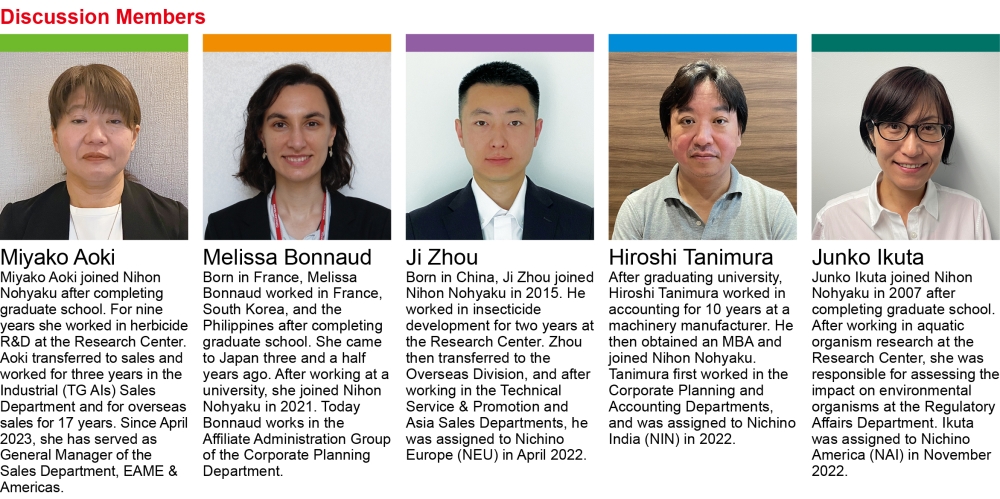
Aiming to Be a Global Innovator
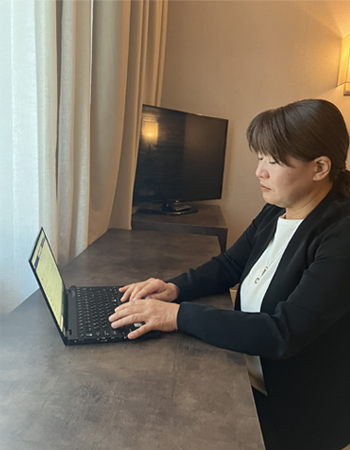
Aoki:I think Nihon Nohyaku’s strengths are that it has its own active ingredients and it is an R&D-driven company that can continuously create new products. What is the company’s position in the countries where you work?
Tanimura:In India, Japan has considerable brand power and Nichino India is showing rapid growth, so it is known as a vibrant company. Some of our employees came from multinational companies in the same industry.
Zhou:Japan has a good image in Europe as well, but the local multinational companies are dominant in the market. We target niche markets and focus efforts on providing technological support to farms with the aim of expanding the market share.
Ikuta:Nichino America (NAI) is small but we focus on agrochemicals for key crops like vegetables, citrus and nuts, and provide flexible support in close communication with customers. For example, NAI sales and development teams provide advice on the best time to apply agrochemicals in close collaboration with agrochemical management advisors and small-scale crop producers that competitors can’t focus efforts on. Our goal is to become a respected leader in the US agrochemical industry in the future. We also hope to expand from producing agrochemicals that utilize the R&D capabilities of the Nichino Group into areas other than chemically synthesized agrochemicals like biopesticides, and have them contribute as a growth driver of the Nichino Group.
Bonnaud:I have only been in the agrochemical industry for a year and a half, so I don’t know much about global circumstances yet. I’m still learning.
Aoki:You should visit as many Group companies outside Japan as you can. Considering that our aim as a company is to be a “Global Innovator,” what specific activities are your companies undertaking?
Tanimura:Besides working to increase sales in the Indian market, we are the only Group company outside Japan that manufactures active ingredients for agrochemicals, so one of our goals right now is to supply intermediates and active ingredients within the Group at lower cost. Eventually, we hope to achieve competitive manufacturing capabilities as a global production site and be a company with several products that are the first choice in India.
Zhou:Nichino Europe (NEU) is mainly a BtoB company, so it is not widely recognized by consumers. We work to spread the Nichino brand among farmers. When developing new agrochemicals, Nihon Nohyaku considers not only the safety of the users, but also always tries to ensure products are friendly to both the environment and natural enemies. In the development process, we conduct assessments not only in Japan, but also in Europe and other countries to ensure they can be used by farmers worldwide.
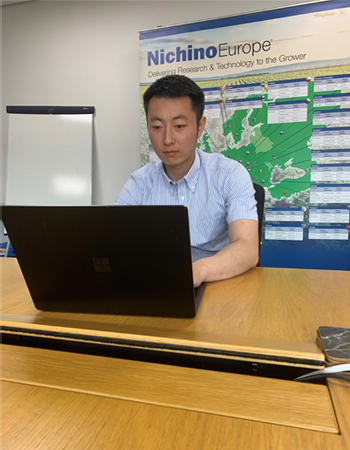
Ikuta:In order to facilitate the enhancement of global business, we established the Global Strategy Project (GSP) in 2021. The GSP aims to accelerate R&D by involving Group companies outside Japan starting from the initial development stage. As part of the project, we hold Global Regulatory Meetings (GRM) twice per year where staff that handle registration in each country shares information such as the state of registering our Company’s active ingredients, technological problems, and new guidelines in each region.
Bonnaud:I joined the GSP one year ago. Instead of development and registration, I worked on standardizing the global group logo to spread the brand.
Aoki:Sharing information is essential for Group companies around the world to work together effectively. One global activity we are carrying out in Japan is taking part in “J-Methods Farming,” a project organized by the Ministry of Agriculture, Forestry and Fisheries (MAFF) to improve productivity in India. We participate in meetings in Japan and provide products and technology through Nichino India. We are also a member of the MAFF’s Public-Private Council for Promoting Global Food Value Chain.
Bridging Culture Gaps
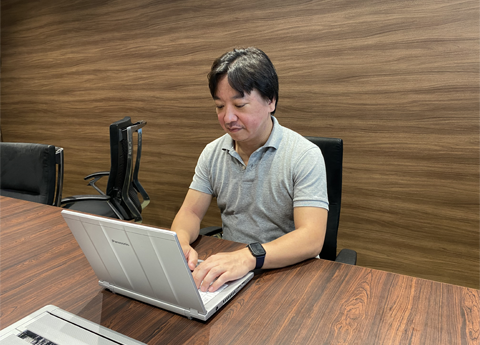
Aoki:Do you experience culture gaps at work? I have done business outside Japan, and experienced someone refusing to shake my hand for religious reasons before, so I try to obtain as much information as possible in advance and make efforts to respect others’ culture.
Tanimura:I’ve never felt totally bewildered before, but I do feel there are cultural differences with Japan. I have often asked people to do a task and they say “I can do it,” but don’t if I just wait, so I have to keep pressing them over and over.
Zhou:In Europe people say clearly whether they can or can’t do something. If I ask, “Can you do this by tomorrow?” they usually respond straightforwardly, “I’ll do it next week.” It goes well if I give plenty of time.
Bonnaud:There are miscommunication and cultural differences at times, but I’ve worked in several different countries before so I don’t really experience much culture shock here. I still have a lot of language-related problems though, so when I’m having difficulties communicating, I use an online dictionary or ask those around me. One thing that was a culture shock for me was that they have a lot of meetings in Japan. I’ve gotten used to it though.
Tanimura:A lot of people like to talk in India, and some will talk an hour or two until they’re satisfied if you let them. During meetings, some use their smartphones and it is normal to hear the phone ring. Some people even take calls in the middle of a meeting.
Zhou:Meetings are short here [in Europe]. If a meeting is scheduled to last an hour, it will always end before then. Busy people will sometimes schedule three meetings in an hour. I think it would be a good idea to get people together who normally work in different places at monthly meetings to create opportunities to talk about things for a long time that aren’t normally discussed.
Ikuta:There is a language barrier, though, and it takes a long time for me to understand, especially in meetings. But my coworkers are all kind and are even attentive outside work, so they’re a great help. If I can’t understand something that was mentioned in a spoken conversation, I ask again in an online chat or email, and they explain it carefully to me. The USA is a car-based society and I didn’t have a driver’s license when I came to the USA, but I got one thanks to everyone at NAI giving me their complete support.
Aoki:With the advancement of globalization, recently the company has been flexibly assigning talent regardless of nationality or career history. Psychological barriers to differences are breaking down and I think it has become a more accepting environment. What kind of support do your companies offer?
Bonnaud:I work in the Corporate Planning Division. I haven’t experienced discrimination due to my nationality and I do the same work as others. The atmosphere at work makes it easy to talk to others, and there is a system in place where workers are asked what their wishes are at MBO meetings, so I think it is fairer than other companies. It is hard to write documents in Japanese, though.
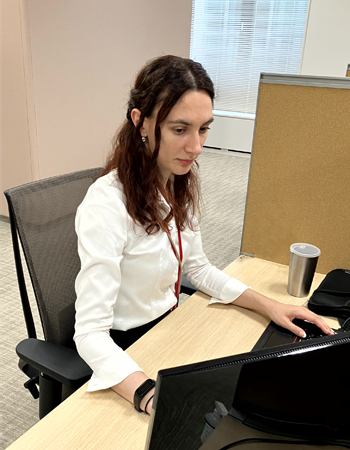
Zhou:Although it’s different from Japan’s, NEU also has an employee performance review system and standards. I think it is a harmonious company where individual differences are considered a given since there are people from all over Europe. There are no barriers and good communication between different departments, and robust support is offered to foreign nationals, including helping obtain work visas, so I can focus on my job.
Tanimura:With regard to Nichino India, I think it’s necessary to align our human resources system with global standards. The Head Office in Tokyo is moving forward with discussions on a global personnel system, so there may be discussions in the future about revising the system in alignment with their actions.
Ikuta:I've been given opportunities to study trends in US agrochemical registration regulations and farm types by participating in academic conferences and visiting farms, and provided opportunities to network with locals. In terms of women’s empowerment, many people take business trips or are assigned to positions overseas regardless of gender or career history, so I think we’ve been given equal opportunity.
Aoki:When I first joined the company, we rarely allowed women to take overseas business trips alone because it was “dangerous,” but that has changed significantly.
Ikuta:Since the online environment has improved, there are more opportunities to communicate internationally, but I feel people are still not completely expressing their true thoughts and feelings. In addition to the current system of transferring people overseas for several years at a time, if a large number of employees were given the opportunity to be temporarily assigned to other countries for a few months (between Nihon Nohyaku and Group companies overseas), it would deepen understanding of the languages, cultures, business operations, and farm types of the countries. Actively exchanging opinions and sharing information on a daily basis through the GSP I mentioned earlier is another important way to achieve cross-cultural mutual understanding.
Achieving Further Diversity
Aoki:What challenges and expectations do you have to achieve further growth in terms of diversity?
Tanimura:First and foremost, we want to increase revenue more in line with the growth of India’s vast market. That would contribute to the advancement of India’s agriculture and economy, and also increase what we can provide to the Group.
Zhou:When you go to another country, the view is different from when you are in Japan. I don’t get much information from the Head Office and sometimes receive requests without any background information. It is important to share information beforehand and have the intention to communicate. I would like to act as a go-between to promote good communication with Japan to ensure employees in other countries understand and are satisfied.
Ikuta:Yeah, from the perspective of overseas Group companies, it’s hard to speak candidly with the parent company. Personally, I’ve always felt that the terms “parent company” and “subsidiary” bring to mind a hierarchical relationship. Given our emphasis on group management now, I think maybe we should start using the term “Group companies.”
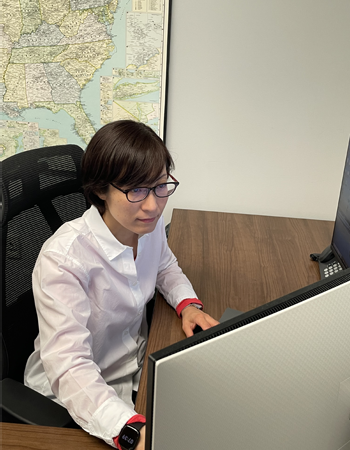
Bonnaud:In order to generate Group synergy, we need to share a wide range of knowledge and experiences. I think it would be a good idea to create opportunities to share employees’ experiences, expertise, and opinions like the GSP. To drive diversity, it is essential to have a flexible, open-minded, and unbiased attitude that doesn’t rely on past experiences or preconceived notions. I believe we need to increase diversity further in Japan as well, which includes women and foreign nationals. I think we should convey to more people that we have a comfortable work environment where employees can flexibly utilize flextime, teleworking, and so on. In fact, many of my friends have said they are jealous of me.
Aoki:I agree. If every individual plays an active role, I think it will lead to driving diversity. The task of companies is to figure out how to ensure that every employee leads a comfortable life and is happy regardless of gender or nationality. We need to offer career plan consultation from early on, and provide attentive coaching on how to sync that up with individuals’ life plans. For me, I used to be a researcher, so I hope that the Nihon Nohyaku Group contributes to agriculture worldwide by supplying beneficial and safe products to farmers around the globe through the development of safe and helpful agrochemicals.
Thank you everyone for your time today.
